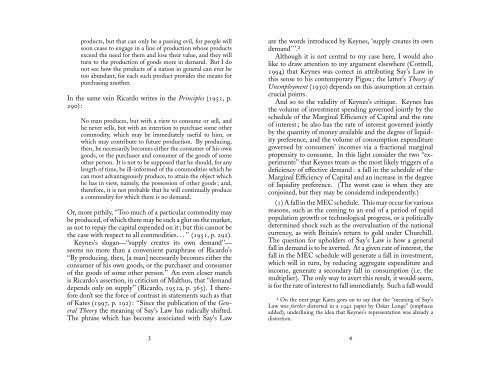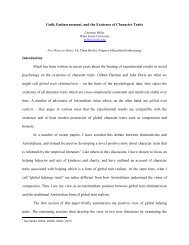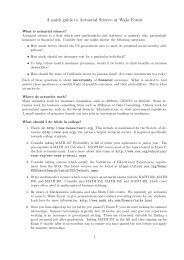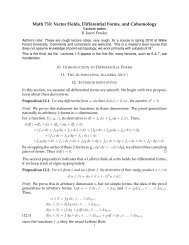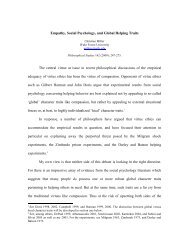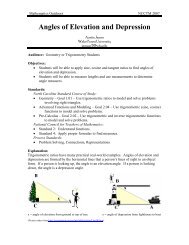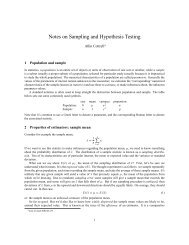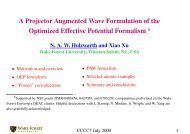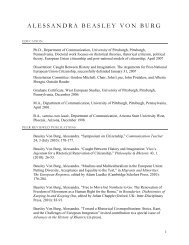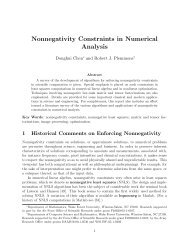Keynes, Ricardo, Malthus and Say's Law - Wake Forest University
Keynes, Ricardo, Malthus and Say's Law - Wake Forest University
Keynes, Ricardo, Malthus and Say's Law - Wake Forest University
You also want an ePaper? Increase the reach of your titles
YUMPU automatically turns print PDFs into web optimized ePapers that Google loves.
products, but that can only be a passing evil, for people willsoon cease to engage in a line of production whose productsexceed the need for them <strong>and</strong> lose their value, <strong>and</strong> they willturn to the production of goods more in dem<strong>and</strong>. But I donot see how the products of a nation in general can ever betoo abundant, for each such product provides the means forpurchasing another.In the same vein <strong>Ricardo</strong> writes in the Principles (1951, p.290) :No man produces, but with a view to consume or sell, <strong>and</strong>he never sells, but with an intention to purchase some othercommodity, which may be immediately useful to him, orwhich may contribute to future production. By producing,then, he necessarily becomes either the consumer of his owngoods, or the purchaser <strong>and</strong> consumer of the goods of someother person. It is not to be supposed that he should, for anylength of time, be ill-informed of the commodities which hecan most advantageously produce, to attain the object whichhe has in view, namely, the possession of other goods ; <strong>and</strong>,therefore, it is not probable that he will continually producea commodity for which there is no dem<strong>and</strong>.Or, more pithily, ‘‘Too much of a particular commodity maybe produced, of which there may be such a glut on the market,as not to repay the capital expended on it ; but this cannot bethe case with respect to all commodities. . . ’’ (1951, p. 292).<strong>Keynes</strong>’s slogan—‘‘supply creates its own dem<strong>and</strong>’’—seems no more than a convenient paraphrase of <strong>Ricardo</strong>’s‘‘By producing, then, [a man] necessarily becomes either theconsumer of his own goods, or the purchaser <strong>and</strong> consumerof the goods of some other person.’’ An even closer matchis <strong>Ricardo</strong>’s assertion, in criticism of <strong>Malthus</strong>, that ‘‘dem<strong>and</strong>depends only on supply’’ (<strong>Ricardo</strong>, 1951a, p. 365). I thereforedon’t see the force of contrast in statements such as thatof Kates (1997, p. 192) : ‘‘Since the publication of the GeneralTheory the meaning of Say’s <strong>Law</strong> has radically shifted.The phrase which has become associated with Say’s <strong>Law</strong>are the words introduced by <strong>Keynes</strong>, ‘supply creates its owndem<strong>and</strong>’ ’’.²Although it is not central to my case here, I would alsolike to draw attention to my argument elsewhere (Cottrell,1994) that <strong>Keynes</strong> was correct in attributing Say’s <strong>Law</strong> inthis sense to his contemporary Pigou ; the latter’s Theory ofUnemployment (1930) depends on this assumption at certaincrucial points.And so to the validity of <strong>Keynes</strong>’s critique. <strong>Keynes</strong> hasthe volume of investment spending governed jointly by theschedule of the Marginal Efficiency of Capital <strong>and</strong> the rateof interest ; he also has the rate of interest governed jointlyby the quantity of money available <strong>and</strong> the degree of liquiditypreference, <strong>and</strong> the volume of consumption expendituregoverned by consumers’ incomes via a fractional marginalpropensity to consume. In this light consider the two ‘‘experiments’’that <strong>Keynes</strong> treats as the most likely triggers of adeficiency of effective dem<strong>and</strong> : a fall in the schedule of theMarginal Efficiency of Capital <strong>and</strong> an increase in the degreeof liquidity preference. (The worst case is when they areconjoined, but they may be considered independently.)(1) A fall in the MEC schedule. This may occur for variousreasons, such as the coming to an end of a period of rapidpopulation growth or technological progress, or a politicallydetermined shock such as the overvaluation of the nationalcurrency, as with Britain’s return to gold under Churchill.The question for upholders of Say’s <strong>Law</strong> is how a generalfall in dem<strong>and</strong> is to be averted. At a given rate of interest, thefall in the MEC schedule will generate a fall in investment,which will in turn, by reducing aggregate expenditure <strong>and</strong>income, generate a secondary fall in consumption (i.e. themultiplier). The only way to avert this result, it would seem,is for the rate of interest to fall immediately. Such a fall would² On the next page Kates goes on to say that the ‘‘meaning of Say’s<strong>Law</strong> was further distorted in a 1942 paper by Oskar Lange’’ (emphasisadded), underlining the idea that <strong>Keynes</strong>’s representation was already adistortion.3 4


